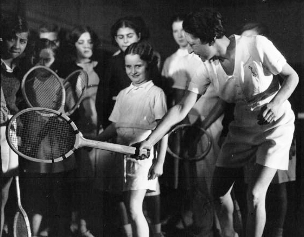Sports
Tennis: Types of Shots
Tennis
Gameplay Tennis
Shots Tennis
Strategy Tennis
Glossary
Back to the main Tennis
page
Tennis Shots
To play tennis competitively there are certain tennis shots that the tennis player must learn. Each of these shots have variations that may play into a players strengths or style of play. Shots that are important include the forehand, backhand, serve, volley, lob and drop shot. Each shot has a certain time in a point where it is best played. Professional tennis players practice hours upon hours to perfect these shots and turn them into winners. Some shots like the overhead smash are primarily attack shots or offensive shots, other shots like the lob are primarily used for defense.
 Instructor demonstrating the forehand stroke
Instructor demonstrating the forehand stroke
Source: Bibliotheque nationale de France
Forehand Shot
The forehand is often the easiest and the first stroke or shot that the tennis player learns. The forehand is made by swinging the tennis racquet across the body on the same side of the body as the main hand in which the racquet is held. Most tennis players use a single hand to grip the racquet for the forehand, but some players use a two handed grip. Different players like to use different styles of grips when executing the forehand. Some popular forehand grips include the Western, the Eastern, and the Continental.
The forehand can be a devastating and powerful attack shot. It is often the most potent of a players weapons from the beginners level to the professional.
Backhand Shot
The backhand is sort of the opposite of the forehand. The backhand shot is made by swinging the racquet away from the tennis player's body or on the opposite side of the body from the hand (or strong hand) that is controlling the swing. Many players use a single hand to execute the backhand, but there are also many players that use a two-handed backhand.
The Tennis Serve
The serve is the shot that starts the point in tennis. The serve is hit from behind the baseline and on one side of the court into the service box diagonally from the server. The tennis player usually tosses the ball in the air and hits the ball at it's peak height in order to get the best angle possible. Many professional players can hit serves well over 100mph that are nearly impossible to return. When a serve is hit that the opposing player cannot hit, this is called an ace.
The Volley
A volley shot is where the tennis player strikes the ball before it bounces. The idea is to return the ball quickly before the opponent can adjust. Often players will charge to the net and then volley the ball quickly back at the opponent for a winner. Another type of volley is the half-volley where the ball is hit on the rise right after the bounce. A charging player may have to half-volley a shot that is too low to volley.
The Lob
The lob is a very high shot. It is usually hit for one of two reasons 1) to hit the tennis ball just out of reach of an opponent that is at the net 2) as a defensive measure to gain time to get back into position on the tennis court.
Drop shot
The drop shot is almost a trick shot. It is used when the opposing tennis player is far back in the court. The tennis ball is hit softly and just over the net to try and get it to bounce twice before the opponent can reach the ball.
Back to Sports
Back to Tennis
More Tennis Links:
Tennis Gameplay
Tennis Shots
Tennis Strategy
Tennis Glossary
Professional Tennis
Williams Sisters Biography
Roger Federer Biography
